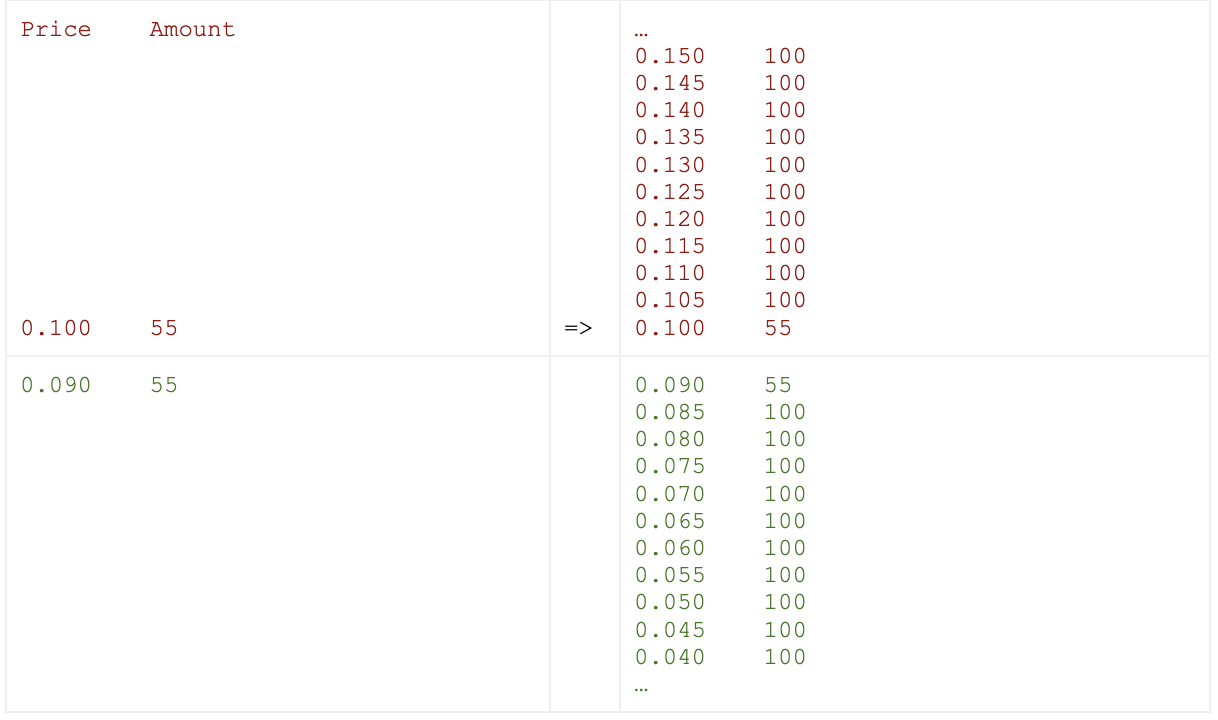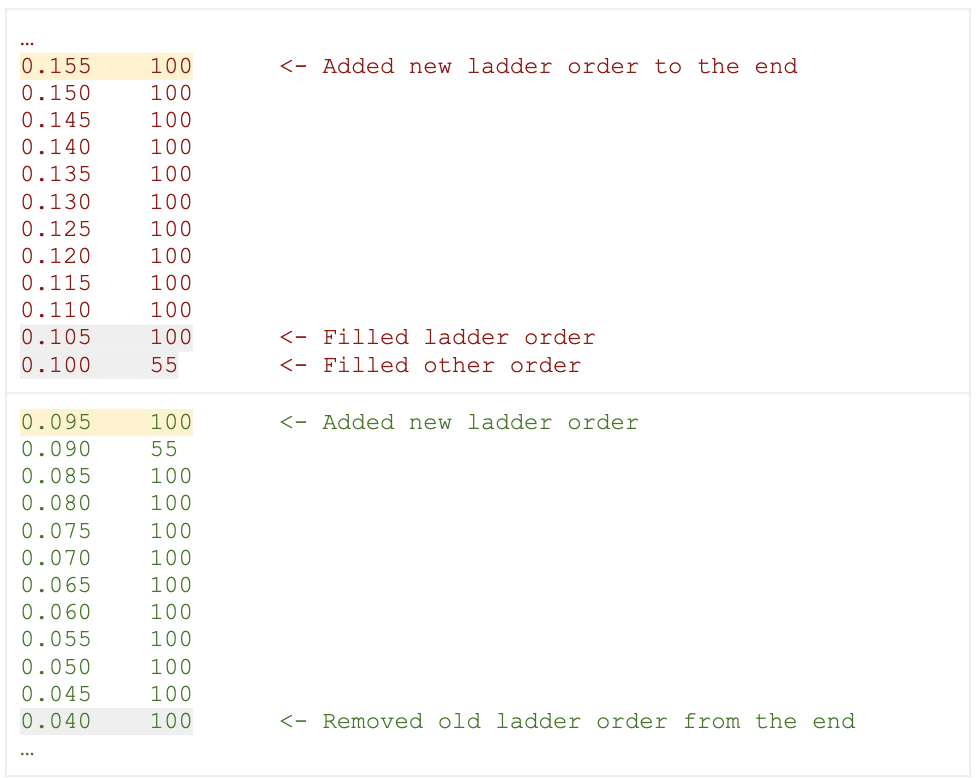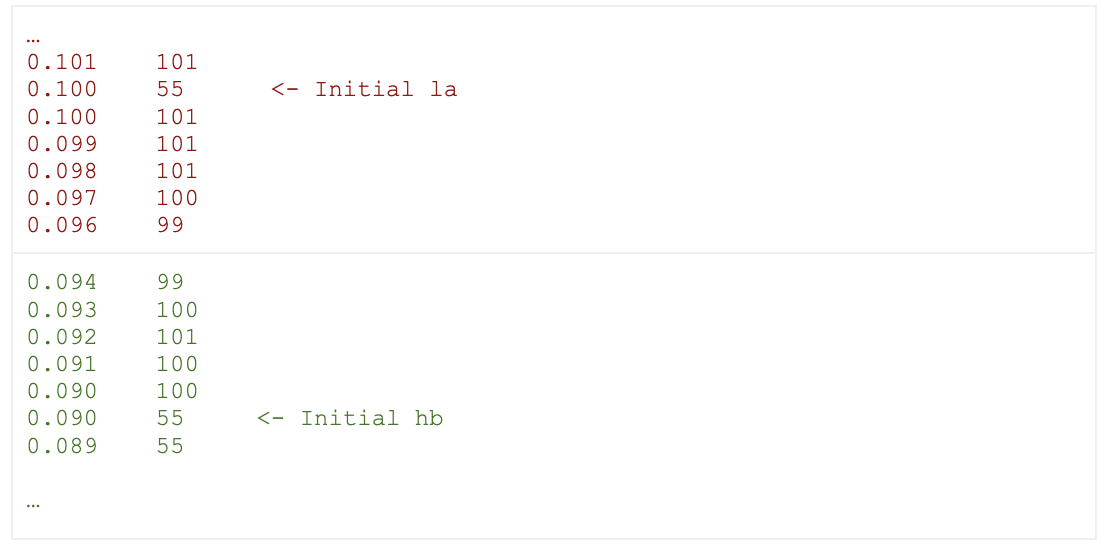-
-
Notifications
You must be signed in to change notification settings - Fork 25
Ladder Algorithm Explained
Optimal ladder/grid trade strategy: when a bot places many orders to buy and sell tokens with prices starting from the spread. When the closest to spread order is filled, a bot adds the same order to the opposite side, following the rule "buy lower than you sell, and sell higher than you buy". It works best in a volatile market.
-
hb— highest bid -
la— lowest ask -
COIN1/COIN2— a bot’s trade pair -
ld— ladder module order type
Ladder orders are intended to realize a trading grid strategy, where the bot places many orders to buy and sell tokens with prices starting from the spread:

When the closest to spread ladder order is filled, a bot adds the same order to the opposite side. For example, if someone takes the 100 COIN1 @0.105 COIN2 ladder sell-order:

Ladder orders:
- Gives a profit, as a bot sells higher than it buys or buys lower than it sells
- Makes the liquidity higher and order books richer
See the Ladder algorithm code.
Current order book:

Command: /start ld 100 USDT 6 1%
Bot steps:
- Calculate middle price:
(0.100 + 0.090) /2 = 0.095 - Place the first bid as
0.095 – 1% = 0.094, amount~99 USDT - Place the second bid as
0.094 – 1% = 0.093, amount~100 USDT - Place the third bid as
0.093 – 1% = 0.092, amount~101 USDT - Place the 4th bid as
0.092 – 1% = 0.091, amount~101 USDT - Place the 5th bid as
0.091 – 1% = 0.090, amount~100 USDT - Place the 6th bid as
0.090 – 1% = 0.089, amount~100 USDT - Place the first ask as
0.095 + 1% = 0.096, amount~99 USDT - Place the second ask as
0.096 + 1% = 0.097, amount~100 USDT - Place the third ask as
0.097 + 1% = 0.098, amount~101 USDT - Place the 4th ask as
0.098 + 1% = 0.099, amount~101 USDT - Place the 5th ask as
0.099 + 1% = 0.100, amount~101 USDT - Place the 6th ask as
0.100 + 1% = 0.101, amount~101 USDT
Result order book:

- ld-orders are stored in local DB with their states:
- Not placed, with a reason:
- Unable to calculate amount
- Not enough balances
- No order id returned
- Open
- Filled
- Partly filled
- Cancelled
- Missed
- To be removed
- Removed
- Not placed, with a reason:
- A bot constantly checks if all of ld-orders open
- If not, it restores orders in
CancelledandNot placedstates - If there is not enough balance to place ld-order, a bot notifies, sets it in
Not placedstate, and tries to place it again on the next check
- If not, it restores orders in
- A bot replaces fully filled orders according to ladder/grid strategy
-
/clear alland/clear ldcommands close all open ld-orders- Set them in
Cancelledstate - If the ladder module is active, it will restore ld-orders on the next check
- Set them in
-
/stop ldwill disable the module and reset all ladder orders' states and history- It will not close opened ld-order. To close them, an admin can run
/clear allor/clear ldadditionally - Next,
/start ldwill create a new grid of ld-orders, not connected to the previous one
- It will not close opened ld-order. To close them, an admin can run
Command to enable ladder module has parameters:
/start ld {AMOUNT} {COIN} {COUNT} {STEP%} [mid {MIDPRICE} COIN2]
-
AMOUNT— order value inCOIN.AMOUNTwill be with a random factor of 2%. It’s a float number with precision depending on an exchange.AMOUNTcan be inCOIN1orCOIN2. -
COUNT— number of orders each side, buy and sell. Total ld-orders count isCOUNT*2. -
STEP%— how much consequent orders will differ by price -
[mid {MIDPRICE} COIN2]— optional middle price setting. If not set, midprice will be(hb + la) / 2.
The command asks for confirmation before running.
To start the Ladder/ Grid strategy with 30 ~100 USDT orders on each side with a 3% step, starting from the current middle token price:
/start ld 100 USDT 30 1%
To disable the ladder module:
/stop ld